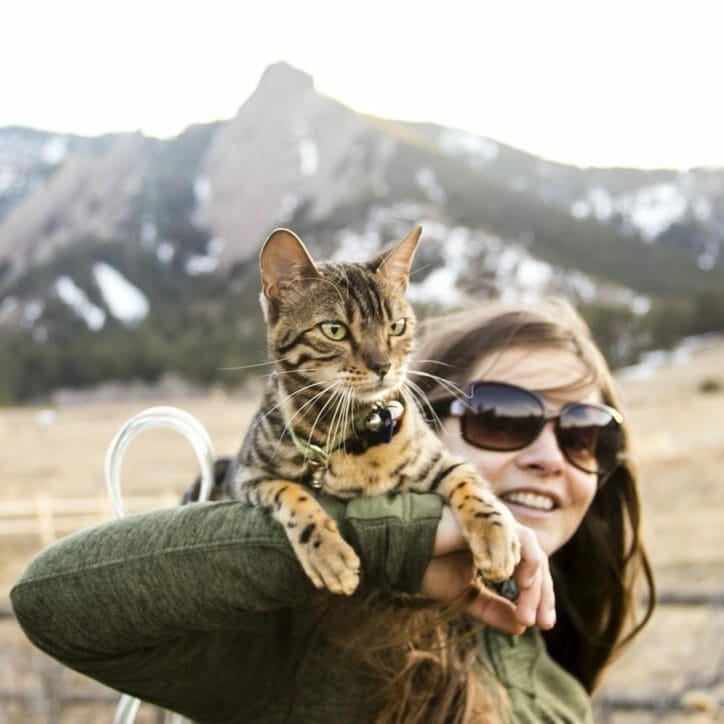9 Signs of Stress in Cats
January 6, 2023
Written By: Earth Buddy Team

Stress can be defined as a state of mental or emotional strain. When cats are stressed, they will display a wide variety of symptoms and behaviors. Some of these signs of stress in domestic cats are subtle and easy to miss, but others are obvious and make it clear something is wrong. Stress can lead to anxiety, depression, and exhaustion, among other detrimental effects on your furry family member.
#1: Hiding
Hiding from people and other cats is something cats do to feel safe. This is normal behavior, but if you notice your cat hiding more often than usual, it could be a sign of a stressed cat. Unfortunately, stress can affect your cat’s physical health as well as mental health since the body uses up energy trying to deal with it instead of focusing on healing and maintaining itself.
Hiding can also be a sign of illness or pain. Stressed cats with an illness may seek out dark spaces where they feel less vulnerable and exposed to germs or sunlight. An injured cat may hide from other cats or people in fear of further injury while they heal if they have hurt part of their body.
#2: Abnormal Grooming Behavior
Unlike dogs, grooming is a natural behavior cats do to keep themselves clean. If they gaze at you with a blank stare, stare at a wall, or groom themself excessively can be a sign of a stressed cat.
According to the Two Crazy Cat Ladies,
“…most cats will spend about 40% of their waking hours grooming themselves. This is normal. What’s not normal is realizing your cat is grooming every time you see them.”
Excessive grooming is often seen in stressed cats who are trying to relieve their anxiety by licking themselves to calm down. You’ll notice your cat may have bald spots where they have been grooming excessively, which is not only uncomfortable for them but also painful and can lead to skin lesions and infections if left untreated.
If your cat starts licking their fur more frequently, it could be because they’re experiencing some sort of discomfort. If you notice your cat’s behavior becomes excessive and doesn’t stop, consider taking them to the vet.
#3: Over-Reactive to Stimuli
Anxious cats are often over-reactive to stimuli and react strongly to changes in their environment. The signs of anxiety in cats can be subtle or extreme, and vary from cat to cat. Some cats may only show signs of anxiety when strangers come into the house, whereas others may become anxious when there are loud noises or sudden movements.
An anxious cat with too much stress may display one or more of the following behaviors:
- Becoming aggressive towards other animals or people
- Hiding under furniture or in cupboards
- Avoiding eye contact with people or other animals
- Biting or scratching out of fear
#4: Aggression
Let’s be honest: if your cat is stressed, they may lash out at other pets or people. When a stressed cat feels threatened by another animal or other pets, they may become aggressive to keep them away.
Aggression can be expressed as either overt or subtle signs of hostility. You can often see aggression in your cat’s body language. Overt aggression is often easily recognized and includes growling, hissing, biting, scratching, and swatting. Subtle aggression may take the form of tail-twitching, flattened ears, dilated pupils, piloerection (hair standing on end), freezing, or hiding.
Your cat flapping or swatting at anything that comes near them can also indicate aggression.
#5: Urinating Outside of the Litter Box
Are you having a problem with your cat urinating outside of the litter box? If so, you’re not alone. Many cats begin to use areas other than their litter boxes when they are stressed.
The most common reason for this is that the cat has become uncomfortable with the location of their litter box. Cats like privacy and if they feel like someone can see them while they use the bathroom, they may decide to seek out a more private spot.
If your cat has been using another room or even another area of your home as a bathroom, try moving their litter box into that area and see if it helps. You may also want to consider trying different types of litter or adding more boxes, especially if there are unfamiliar cats in the house, so that there is more than one option available. You should have one litter box per cat in a multi-cat household.
Another important factor to consider is whether or not your cat’s diet might be causing them to have diarrhea or constipation. If this is true, changing their food could help resolve the problem immediately and eliminate any unnecessary stress on your part.
If this behavior continues, ask your vet to check for any underlying health issues your cat may be experiencing.
#6: Destructive Behaviors
Stress can cause cats to behave in ways they normally wouldn’t. Your destructive cat’s behaviors, like chewing or scratching furniture, are common signs of stress in cats and are often the first sign you’ll notice when your cat is under pressure.
This can be caused by changes in the environment, such as moving to a new home, having a visitor stay over for an extended period of time, or even the addition of another pet into the household. If your cat starts behaving this way, try making some adjustments to help reduce their stress level and get your cat’s personality back to normal.
- Provide a lot of stimulation: Cats need mental stimulation just as much as physical stimulation (if not more). Make sure there are plenty of toys around so that they have something fun to play with every day.
- Give them a place where they feel safe: Many cats tend to hide during times when they’re stressed out because it makes them feel secure; if possible find a quiet area of your house where they can go whenever they feel overwhelmed.
- Don’t punish them if they’re acting out: Your cat doesn’t know what’s causing them distress and punishing them won’t make things better; instead, try distracting them from whatever is causing your cat’s stress by playing games or offering treats.
#7: Changes in Sleep
Cats are creatures of habit, and they usually have a routine that they stick to on a daily basis. When you see your cat behaving differently than usual, it could be because they are stressed out.
If your cat is sleeping more or less than usual (and this isn’t due to illness), it’s possible that something stressful has happened in their life. Cats tend to sleep for long periods at night when they’re relaxed and feeling safe, but if there’s something causing your kitty stress, they may wake up more frequently throughout the night or stay awake for longer periods during the day so as not to miss anything going on around the house.
#8: Decreased Appetite
Another sign of stress in cats can be decreased appetite. If your sweet-natured kitty starts refusing food or eating less than usual, but still seems hungry enough to eat something else (like dry cat food), then chances are that something stressful has occurred within the last few days or weeks.
#9: Lowered Interest in Activities
A sudden decline in enthusiasm for normal activities your cat spends time doing, like playing with their favorite laser, might also signal that your pet has had some sort of negative experience recently. If this occurs unexpectedly and without apparent cause, it is likely that there was an issue that caused your cat’s stress.
Sometimes these changes might happen gradually over time because felines tend not only to act differently when they’re stressed out but also feel differently too! In other words, your cat’s stress may not result in an immediate change, but rather may show signs over time. That’s why it’s so important to care for your cat’s physical and mental health at all times.
The Two Crazy Cat Ladies stated:
“One of a cat’s most important instincts is hunting. When we bring these little predators into your home, we call this behavior ‘playing’ But make no mistake- cats want and need to hunt (or play). Regularly bringing them through a cat’s prey sequence reduces stress and brings calm and confidence.”
Find what your cat is interested in and encourage them to pursue it on a regular basis.
Helping Your Cat Using Full-Spectrum Hemp Extract
Full-spectrum hemp extract may be beneficial to your stressed cat. By helping reduce the effects of normal environmental stress, full-spectrum hemp extract can help maintain a normal emotional balance in your cat. It may also promote relaxation and help curb destructive behavior, allowing both you and your cat to live a happier, healthier life together.
Administering CBD for cats is not an easy task, so we often suggest mixing our full-spectrum hemp extracts into their favorite snack or meal. Due to the fact that cats are often smaller, we recommend starting at lower doses around 1-3mg per 10lbs. body weight to start. You can always increase or decrease on an as needed basis.
Earth Buddy offers a Full-Spectrum Hemp Extract product for cats that is grown in small batches on an organic farm in Longmont, Colorado, with minimal processing. The hemp from Earth Buddy is always single-origin without a third party. This way you know where the product comes from and the company knows exactly how it is grown.
For further reading on signs of stress in cats, we recommend:
- https://twocrazycatladies.com/cat-anxiety/how-to-spot-the-signs-of-cat-stress/
- https://twocrazycatladies.com/cat-anxiety/7-proven-steps-to-reduce-feline-stress/
- https://www.vet.cornell.edu/departments-centers-and-institutes/cornell-feline-health-center/health-information/feline-health-topics/feline-behavior-problems-aggression
- https://www.sleepfoundation.org/animals-and-sleep/how-much-do-cats-sleep#:~:text=Cats%20have%20a%20polyphasic%20sleep,from%2050%20to%20113%20minutes
- https://www.ncbi.nlm.nih.gov/pmc/articles/PMC8801065/
You Might Also Enjoy
Learning how to calm a dog down is an essential skill to have in your…
Whole foods are integral to a dog’s diet, offering unprocessed, natural nutrients that promote and…
Hemp seeds, harvested from the hemp plant known as Cannabis sativa, have become known as…




